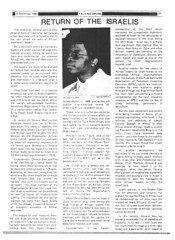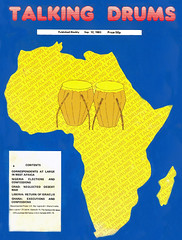Liberia - Return Of The Israelis
By Ben Mensah
On a continent where all reactionary leaders are under a sustained siege from radicals who are itching to overthrow them and revolutionise the whole of Africa, why did General Doe make his unprecedented visit?
His reasons are there to be analysed but before that could be done a further question needs to be reviewed. Why should a visit to Israel make General Doe reactionary? Is it because Israel is a conservative reactionary country or what?
That Israel has been in a state of perpetual war with its Arab neighbours, has often flouted international opinion and until a week ago was led by one of the world's acknowledged hardliners, Menechem Begin, gives it the attributes of a nation more radical than Jordan, Syria, Egypt, Saudi Arabia, Iraq or even Libya.
A review of General Doe's action therefore thrusts him up as Africa's pace-setter. His country, together with Mobutu Sese Seko's Zaire are the only two African countries to defy the 1973 decision of the Organisation African Unity which called on its members to break off diplomatic relations with the Jewish state. Beyond this, General Doe's latest visit has made him the first African leader to set foot on Israel since the OAU diplomatic blockade in 1973.
Undoubtedly, General Doe qualifies to be classified as a radical leader for having taken these actions which may be described either as bold or fothardy, depending on how one views their implications. But there should be no doubt that General Doe has stirred the hornets' nest with his historic visit to Jerusalem. The Arab members of the Organisation of African Unity and their non Arab sympathisers can be predicted to sever all forms of relations with Liberia. The indication for this sort of reaction has come from Saudi Arabia which has already threatened to cut off all economic assistance to African countries.
The impact of such measures from the rich Arab countries will definitely not undermine Liberia's economy which has been bolstered ten times more since General Doe, then Master Sergeant seized power in 1980 and pulled off another unprecedented record for executing Africa's bloodiest coup.
Those who will suffer are countries like Guinea and Sierra Leone which are good neighbours of Liberia and also members of the Mano River Union, who have reaped maximum economic benefit from their close relationship with the Arab League.
President Sekou Toure, who in the past has succeeded in influencing the other members of the Mano River Union to support Morocco in its conflict with the Polisario in return for King Hassan's financial support for Guinea's preparations to host the next summit of the OAU, will be in the greatest dilemma.
He is not only a devout and respected muslim who, last year was nominated to lead a series of delegations to mediate in the conflict between Iraq and Iran but also an elder statesman. and one of the few surviving founders of the Organisation of African Unity on whose shoulders has been thrust the task of hosting the Organisation's twenty-first anniversary.
While General Doe's visit to Israel is likely to drive away from Africa the Arab friends of African leaders like Sekou Toure, the OAU is also likely to split in the same way the other members of the Arab League refused to attend meetings with Egypt for signing the Camp David Agreement and establishing diplomatic relations with Israel.
Coincidentally, it was Egypt's membership of the OAU which warranted the sympathetic diplomatic blockade of Israel for her occupation of Egyptian territory in the Sinai during the 1971 Arab-Israel war. It is therefore significant that General Doe of Liberia, Sese Seko of Zaire and other African leaders are pointing to the restoration of diplomatic relations between Egypt and Israel as one of the reasons for their rapprochement towards Israel.
Another reason for the return of African leaders to Israel relates to the widespread African disenchantment over the policies of the Arab dominated Organisation of Petroleum Exporting Countries (OPEC) which are held responsible for their economic plights. Arab aid through the Arab African Bank has never been considered a sufficient compensation for the harsh economic measures of OPEC and also the loss of Israeli technology, particularly in agriculture.
But the most convenient and current issue being invoked in favour of reestablishing relations with Israel is the activities and objectives of Libya's Colonel Qaddafi in Africa. In West Africa several African leaders, including President Houphonet Boigny of the Ivory Coast, have expressed deep concern about the threat to the stability of their regimes by Col. Qaddafi. It is to counter this Libyan threat that Israeli assistance is being sought.
In another development the politicians in the just ended elections in Nigeria felt so strongly about relations with Israel that one Presidential candidate, Chief Obafemi Awolowo was reported to have raised it at his campaign rallies. No doubt General Doe's action of establishing diplomatic relations and paying a visit to Israel is expected to open the floodgates to other African leaders to play the Israeli card.
Israeli policies in the Middle East may be abhorrent and certainly her support for apartheid South Africa must be condemned by all who have the interest of black Africans at heart yet the fact of under-hand deals between Israel and a number of African countries cannot be denied.
In this context, General Doe has scored a remarkable feat of shedding off hypocrisy in his deals with Israel and has reaffirmed his image as a forthright leader and a pace-setter. With regard to his declared ambition of establishing relations with Israel to enable him to play a mediation role in the Arab Israeli conflict sounds as puerile and infuriating as it is likely to emanate from a soldier who aspires to become an international diplomat who would soon realise that he can only talk to the Israelis and not to the Arabs.
Both the Israelis and General Doe have used the alleged threatening activities of Libya in Africa to justify their accord and for as long as this threat persists, will continue to receive sympathetic reception and in fact encourage other countries to follow suit but when the Libyan factor vanishes, they will soon realise their real intentions being questioned.
Even more disturbing is the failure of General Doe to alert the Organisation of African Unity about his plans towards Israel. With support from all those countries that are opposed to Colonel Qaddafi's Libya, General Doe could have given notice to the OAU of his intention to follow Egypt to re-establish diplomatic relations with Israel. And since the OAU does not seek to interfere in the internal affairs of a member country Liberia couldn't have been stopped in its tracks. There is a precedent to have guided General Doe. President Mobutu Sese Seko of Zaire has re-established diplomatic relations with Israel but that did not stop even Colonel Qaddafi from inviting him to attend the OAU summit in Libya.
By his act General Doe has given a doubtful start to the upcoming OAU summit in Conakry, Guinea and it will take host President Sekou Toure, current Chairman Mengistu of Ethiopia and the Secretariat of the Organisation a lot of diplomatic skill to save the unity of the continent.
Government is a contrivance of human wisdom to provide for human wants. Men have a right that these wants should be provided for by this wisdom.
— Burke

